So, Everyone Has Pointed Out How Funny It Is That Fifteen Claimed To Have Gone Through Therapy And Be
So, everyone has pointed out how funny it is that fifteen claimed to have gone through therapy and be fine now only to immediately act just like his old traumatised self and it is but like…
Has anyone considered fifteen was lying?
What if he hasn’t actually experienced that domestic bliss that fourteen got to enjoy or have fourteens memories following their split at all?What if he just told fourteen he did to convince him to stay on earth and be happy so fourteen could have a chance at happiness that fifteen believes he will never have and doesn’t deserve and his seemingly incredibly upbeat personality is just a facade?
I mean this sounds incredibly in character for the doctor to me tbh
More Posts from Gentildonna and Others
Neil talking about this season being inspired by Austen just hit me:
Aziraphale is like the Emma for his side of the story. He’s trying to arrange everything just so. He wants people to be happy without pausing to ask what they want. He has this perfect ideal of how everything is going to go and he’s clinging to it. He will arrange for people to fall in love and everything will be fine! Which makes Crowley his Mr. Knightley, fond but critical of Aziraphale’s schemes and entirely smitten on him without giving it voice until it’s too late.
Only he and Crowley are in different books. Crowley is the Lizzie Bennett. He’s the one who won’t do what is expected of him and asks questions and rejects the role he’s meant to be in. He misinterprets Aziraphale’s actions and intentions and in the proposal it’s very much like Darcy’s first awful “I love you against my better judgement” proposal. And likewise, he doesn’t understand that a lot of Aziraphale actions are in the name of protecting him, much like Darcy is trying to shield people from Wickham without ever explaining why.
They are running in different narratives in their own heads because they never talk to each other. They never ask what the other wants or fully understands what the other is thinking. There’s always another side to the story and neither of them is fully aware of it.
I can’t remember if this is right, but I think Neil mentioned Mansfield Park as Aziraphale’s favourite and I feel like this is prescient for the set up for season 3.
Russell OMFG T Davies, I hope you know what you're doing.
Because I don't want him to go.
I'm not ready yet.
I'm not sure I will ever be.
Well, I'm rather sure I won't.
We've had Doctor and Donna for... what, an hour and a half of shared screentime?.. and now we're leading into the finale that would most definitely break theirs' and our hearts, right?
Oh for fuck's sake, why do I even care that much?!
Cause I love them, that's why. Simple as that.




















Fourteen as Crowley: part 1 • (2)
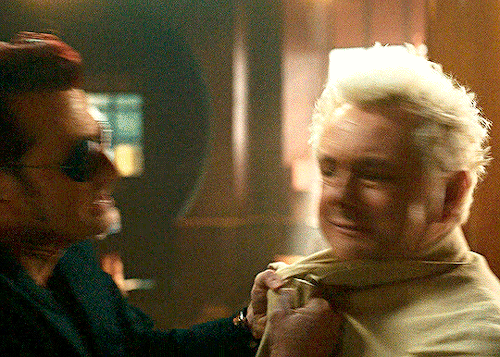
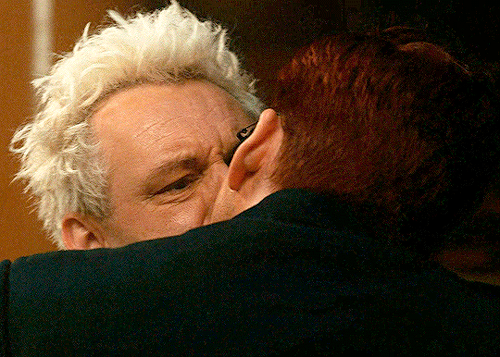
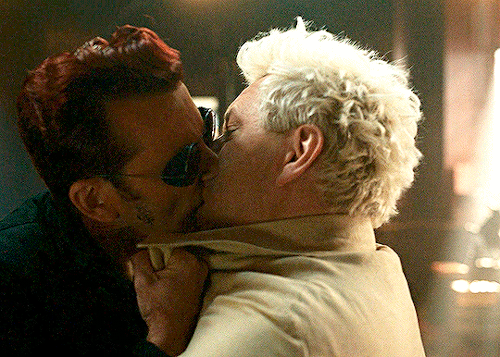
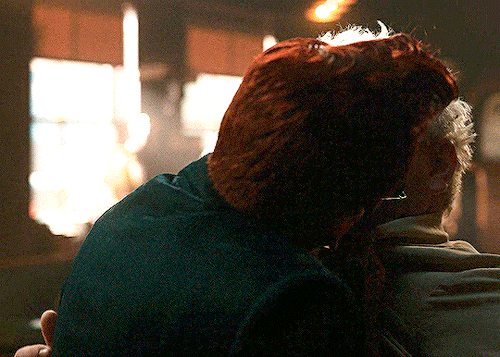
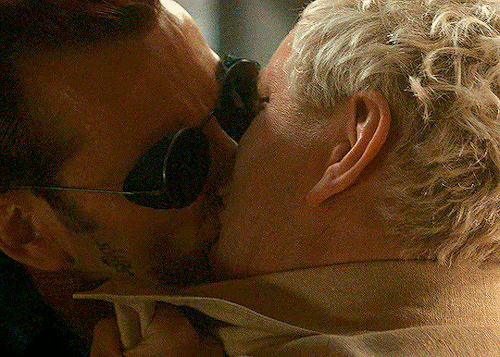
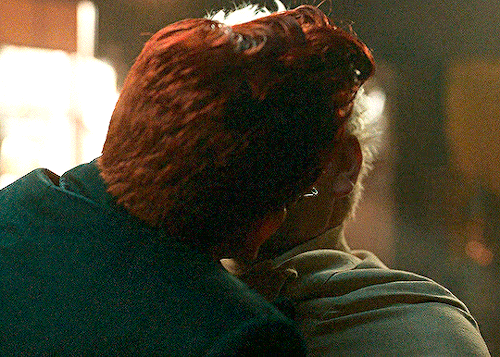
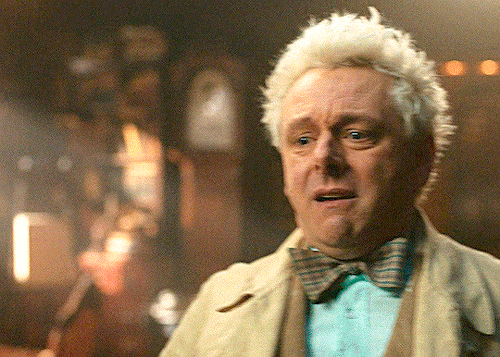

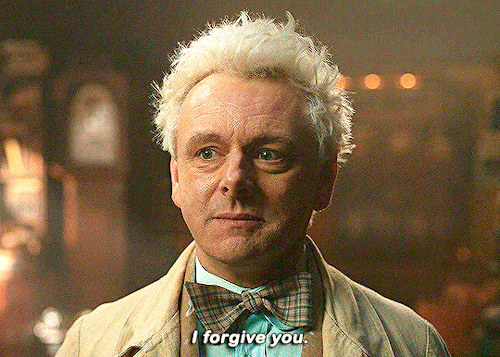
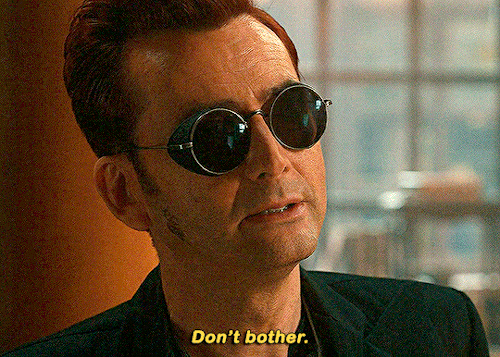
You idiot. We could've been... us.
(Almost) exactly my sentiment! Thank you so much for expressing it better than I ever could hope to do myself.
RTD explaining why he didn’t put Then-Three in Thirteen’s outfit, is not an excuse. It is his genuine thought process.
Nobody has to like it, I don’t like it, I understand his reasoning but I would still have done it anyway.
But no, damn it, the trans rights campaigner is not transphobic for fearing the British public’s transphobia.
Look. Have a moment of honesty with me right here. Is there not even a teeny-weeny bit of you that wanted Ten-Three in 13’s clothes because you think it would look a bit funny. Because it would have, that’s why we made funny art about it.
I do not think it’s beyond the pale, for Russell to know that would be the case, and go, ‘No. I don’t want that to be a laughing matter.’
The episode he’s got next has a trans character in it. Deliberately casted as trans. This will be a feature. Considering that it is something that will be handled seriously, him not wanting to start off on the foot of ‘ha ha man look funny in lady’s clothes’ is understandable.
Again, I think it would have been alright, but it’s understandable he is afraid of this. He has been incredibly vocal about trans people and trans issues, he has not been sat idly by as trans people are being attacked as Britain becomes TERF Island, please take a moment to understand what a gay man of his age is thinking seeing all this, people’s reactions, the legislation, he’s watching time run backwards.
Perhaps you had to be there, but even with Doctor Who’s drop in popularity, you should’ve seen the reactions to things like the pregnant man in Chibs’s first series. Russell knows his own joke with Cassandra that was just meant as a comment on her not remembering her life was taken and used by goddamn transphobes.
That he is afraid that your first reaction to Ten-Three in Thirteen’s clothes would be a giggle, is not unfounded, or unreasonable, and while I think he is catastrophising here, we are currently in a state of catastrophe over trans issues and depictions, that he is trying to make better, not worse, when he is aware that this moment will be ON THE EVENING NEWS. For every single Not-We to see.
He clearly is covering trans issues, we know he’s covering trans issues, doing so in an episode where he brings back David Tennant so literally everyone and their mum is going to watch and he knows it. And he wants to do everything right so that people do not just go into it with ‘man dressed as lady lol’.
We all would probably have taken the risk here. Felt that doing this might be more boundary breaking (positive) than funny (negative). But a moment of empathy for why he would choose to do this. Because we might have taken the risk and that turn out to have been the wrong move. That he wants to be more careful than risk adding even a splash of fuel to the fire is completely understandable, and if you don’t think so, you might not realise how much trans people in my country are already being burned.


Funny (and kinda revealing) thing is that for years I’ve stuck to that moody picture of the Doctor walking through the clouds/smoke to the TARDIS as my lock screen wallpaper. Then I went through a couple of official posters for GO S1, then reverted to my trusted and almost monochrome Ten… and now this.
I see some parallels, so to say.
DT talk throwback: my interview w/David Blair, director of Takin' Over The Asylum
Over half a decade ago now I was a writer for David Tennant News/DT Forum, one of the bigger unofficial fan sites of DT's at the time (now sadly defunct). During my time there, I got the chance in Jan 2016 to interview David Blair - most notably the director of Takin' Over The Asylum, though he worked with DT in three other shows - about those projects, and what he remembered about David. I didn't want this interview to sink into the depths of the Wayback Machine and I thought y'all might enjoy reading it, so here is that interview in its entirety:


David Blair, Director / Front Cover of BBC DVD for Takin' Over The Asylum (UK)
Hello Mr. Blair! From 1992-1996 you worked with David Tennant on four separate television shows: Strathblair in 1992, The Brown Man in 1993, Takin' Over The Asylum in 1994 and A Mug's Game in 1996. Were you at all involved in the casting process for Strathblair, the first project you worked with David on... If so what did you see in the young actor that won him the role? And how did that translate into choosing him as Campbell Bain?
I was a Producer at the BBC before I started directing. David was a student at the Royal Scottish Academy of Music & Drama in Glasgow. He asked if he could meet me just to talk through procedure for TV, interviews, etc., as the college appeared more interested in theatre than camera. Indeed, frowned on the latter! He’d be about 18 then. I certainly knew from the outset that he ‘had something,’ and I gave him a few minor opportunities as soon as I embarked on my directing career. To be clear, I only work with actors I want and believe in – still do. Some might say my own career has been stifled by this obduracy but I don’t care. My need of working with great actors is paramount and David’s a shining example of what makes it all worthwhile. I commissioned Takin’ Over The Asylum for the BBC and worked closely with the writer throughout the creative process. I knew as soon as I read the screenplay, David was going to be perfect for Campbell. But I’m not a fascist about this kind of decision-making, so I mentioned to the writer and Casting Director I had a boy ‘in mind’ for the role. I didn’t oversell; I knew he would make it work for himself. There may have been some minor scepticism at first, but when he did his audition, he blew them away.
David's audition tape for Takin' Over The Asylum
Many of David's fans have seen Takin' Over The Asylum and are well-versed with it. Can you talk more about Strathblair, The Brown Man and A Mug's Game, and David's roles in each? Little is known about the roles he played in those productions. Can you give us any insight into the stories behind all three of the projects themselves, and what was it about David in those years that made you want to cast him in all of them?
In truth, Strathblair and The Brown Man were merely cogs in my directing wheel. They weren’t aesthetically of great merit but gave me a few credits to kick-start my career. What I needed was a ‘signature piece’ and that came along with Takin’ Over The Asylum. In many ways, I regard that as the start of my directing career. In those days, without a high-profile production on your CV, you would more than likely be destined for a treadmill of soaps and ‘continuing drama’. Before Asylum I was picking up scraps; after it, I was being asked what I wanted to do. Thus A Mug’s Game became my second collaboration with Donna Franceschild, who’d written Asylum. Ken Stott, Katy Murphy and others from Asylum were already on board - and really? We just wanted David to ‘be in it’. It wasn’t a huge role but he kindly agreed to come in and do it for us. Played a music student (at the Scottish Academy, as it happens), as I recall but, again, hugely professional and accomplished. In one scene, he had to throw up over the railway tracks at Partick train station in Glasgow.... ah, an enduring memory.....

Did David do anything on set of any of the productions he worked on with you that totally took you by surprise or that was unexpected? What did he do?
I think in those days, more than anything, it was important to keep in mind just how young he was. This boy of 21, was commanding the space, displaying an extraordinary ability to create laughter and tears; sometimes both at the same time! He had natural charm and wit and that, combined with this wonderfully spontaneous joie de vivre, made him a joy to be around both on the set and off.
What do you feel David's most unique/valuable attributes as an actor are? What do you think separates him from his peers as he has matured into the career he has today?
When I look at him now I still largely see the same lad I met all those years ago. Still bursting with enthusiasm and an absolute desire to come out on top – which he’s done consistently. He’s retained his appetite, clearly, and devoured a huge range of roles – never seeking a ‘comfort zone’ in the process. It’s also struck me that he’s never attempted to be somebody he’s not and that truth, integrity, diligence – some might say, ‘Scottishness’ (!) – defines the man we see today.
David has said he considers Takin' Over The Asylum a career-defining project for him. What is your reaction so many years down the line to that comment?
I’ve always been rather humbled by David’s regard for myself and Takin’ Over The Asylum. I genuinely never felt I did anything out of the ordinary. I picked the best man for the job which, God knows, he underlined in spades once he played the role. He gave me as much as I gave him. Of course, there are occasions in my own career where I look back at defining moments and say “if it hadn’t been for so-and-so”.... but, I guess, the reason why we can reflect in that way, is because we didn’t let anybody down. David didn’t – and I hope I didn’t. Looking back at Takin' Over The Asylum all these years later, do you feel it still holds up as well as it did? In retrospect do you feel it helped shed as much needed light on the mental health industry as you'd hoped?
Funnily enough, somebody called me the other day to say he’d sat down and watched all six episodes and couldn’t believe how well it’s stood the test of time. I think I agree. I suppose because it’s a subject matter nobody would touch with a bargepole these days – that’s keeps it fresh somehow. All the scripts were vetted by the Association For Mental Health before we signed off on them. The writer had had mental health issues and wanted it to be authentic and in no way derisory. In fact, I remember many of the extras I cast all had had mental issues – one in particular having been institutionalised for 37 years!
I'd like to explore your decision to cast institutionalized patients as extras in Takin' Over The Asylum in a bit more detail. Was this related to filming the series at Gartloch Hospital, and if not, how was the idea first presented and eventually implemented? Was this something you and Donna discussed as part of your intention to make the show as sensitive to the subject matter and as authentic as you could? And did you run into any problems with compensating the extras, or any other issues relating to their Sectioned status?
It was simply an idea I had not just to add authenticity, but to have these guys make a worthwhile contribution to the film – and also make them feel good about it, if you like. I wanted to dispel the notion that all mentally ill people were screaming banshees – the story alludes to this anyway – by whose definition are we mad? I also thought it would help the non-mad actors (if there is such a thing!!!) to be surrounded by the ‘real’ rather than the ‘made up’ and thereby enrich their own performances.
Speaking of Gartloch Hospital, how did you choose that particular hospital for the filming location?
Gartloch was one of several mental hospitals around Glasgow being run down at the time, as part of the government’s controversial ‘care in the community’ programme. In other words, ‘we don’t want to pay to look after them any more, so you do it’. Of all the ones I looked at, Gartloch – not least with its huge tower – seemed to provide the best ambience; most suitable for the story and visually rewarding also.
Exploratory views of the interior and exterior of (now abandoned) Gartloch Hospital
As you mentioned, you do certainly seem to gravitate towards actors and writers that inspire you. Years ago you spotted a certain something in David -- so if given an opportunity, would you be willing to work with David again and if you could choose your own ideal role for him, what would that role entail?
Nothing would give me more pleasure than finding a project that both David and I could work on. David, creatively, is a bit of chameleon, so I don’t think there’s an ‘ideal role’ for him as such. A brilliant piece of writing and a character that takes him a place he hasn’t been before would be the simple remit.
Over the years many fans of Takin' Over The Asylum have expressed their desire to know what happened to Campbell and Eddie after we left them. If you were to continue their story, where do you think Campbell and Eddie would be today?
My hunch is that Campbell would have gone on to be a success in the music industry and Eddie would have tumbled into an even darker place, fueled by alcohol and self-doubt. I’ve often imagined Campbell inadvertently bumping into Eddie while he was sleeping in a cardboard box and Campbell doing for Eddie what Eddie had done for Nana in the very first episode.
Lore is - from Donna amongst others -- that you asked her to take a minor character from a play she'd written and make a drama around him. Of course that character is Ready Eddie McKenna. Could you tell us what the name of that play was? And what was there about Eddie in the framework of that play that made you see him as the kind of character that could carry an entire series - and that Donna was the woman to write it?
With regard to the question below, it’s strange how little fateful moments define what we are and what we do. In my early days as a Producer, I commissioned Donna to write one of four monologues I was overseeing – I didn’t direct it, as it happens, but it was a sterling piece performed by Katy Murphy. The BBC – not myself – then commissioned Donna to adapt a stage play she’d written called And The Cow Jumped Over The Moon to fit a play strand we were doing at the time.
On the day of the studio, the Producer overseeing the project, was taken ill and they asked me to fill in for her ‘in the gallery’. (This was an old TV play where you worked in a rehearsal room for, say, three weeks then shot the whole thing – multi-camera – in a matter of days). Of course, as a result, I became familiar with the material and was indeed taken by this minor character – Eddie – who was a hospital radio DJ. After that, I asked Donna if she felt there might be mileage in creating a serial based around this character. I’d love to go into great and meaningful depth about why I thought that but, in truth, it was just a hunch – although it was one relative to how Donna was writing at that time; I believed she could deliver something unique with wide appeal. She hadn’t done any original TV work at that time (apart from the monologue) and had worries.
It took her some time to finally come up with a first draft – the breakthrough, she told me, came when she switched from just a hospital to a mental hospital. After that, we worked the episodes one at a time getting precisely where we wanted to be on one, before moving on to the next. Not an option that’s often available these days. During this process both Donna and I were supported hugely by the then Head of The Department, Bill Bryden. And that support manifested most clearly in simply leaving us to our own devices. No script executives, story editors or any other distractions. The work we ended up with had the footprint of nobody but ourselves.
And that's that! I hope you all enjoyed this unique insight into Takin' Over The Asylum and DT's work with David Blair.
Don't get me wrong, but Spies Of Warsaw was THE handsomest DT ever looked (before the 60th specials, that is). And un-fucking-believably dashing, too. And a healthy dose of whump never hurts (as opposed to clumsy puns). Rewatch is due.
This DT edit is my Roman empire
-
 inattentivecatlady liked this · 1 month ago
inattentivecatlady liked this · 1 month ago -
 imatrashrat liked this · 2 months ago
imatrashrat liked this · 2 months ago -
 the-most-lamentable liked this · 2 months ago
the-most-lamentable liked this · 2 months ago -
 cheshire-ccat liked this · 2 months ago
cheshire-ccat liked this · 2 months ago -
 onefloatinglurker liked this · 3 months ago
onefloatinglurker liked this · 3 months ago -
 lokaarc liked this · 4 months ago
lokaarc liked this · 4 months ago -
 warlocksorcererorwgatever liked this · 4 months ago
warlocksorcererorwgatever liked this · 4 months ago -
 starryberrybat liked this · 5 months ago
starryberrybat liked this · 5 months ago -
 0-ac-0 liked this · 5 months ago
0-ac-0 liked this · 5 months ago -
 idk-ju liked this · 8 months ago
idk-ju liked this · 8 months ago -
 alleytownstrays liked this · 9 months ago
alleytownstrays liked this · 9 months ago -
 dinnerbug reblogged this · 9 months ago
dinnerbug reblogged this · 9 months ago -
 dinnerbug liked this · 9 months ago
dinnerbug liked this · 9 months ago -
 thespidersfrommarz reblogged this · 9 months ago
thespidersfrommarz reblogged this · 9 months ago -
 thespidersfrommarz liked this · 9 months ago
thespidersfrommarz liked this · 9 months ago -
 blackbonnet-ruined-my-life liked this · 9 months ago
blackbonnet-ruined-my-life liked this · 9 months ago -
 autismvampyre liked this · 9 months ago
autismvampyre liked this · 9 months ago -
 itsoveranakin-ihavethehighground reblogged this · 9 months ago
itsoveranakin-ihavethehighground reblogged this · 9 months ago -
 atalanta133 liked this · 9 months ago
atalanta133 liked this · 9 months ago -
 kestrel-wylde liked this · 10 months ago
kestrel-wylde liked this · 10 months ago -
 927roses-and-stuff liked this · 10 months ago
927roses-and-stuff liked this · 10 months ago -
 therealsamtylertm reblogged this · 11 months ago
therealsamtylertm reblogged this · 11 months ago -
 therealsamtylertm liked this · 11 months ago
therealsamtylertm liked this · 11 months ago -
 the-notorious-m-a-c liked this · 1 year ago
the-notorious-m-a-c liked this · 1 year ago -
 azurestar liked this · 1 year ago
azurestar liked this · 1 year ago -
 j2badwolfclevergirl liked this · 1 year ago
j2badwolfclevergirl liked this · 1 year ago -
 livibug14 liked this · 1 year ago
livibug14 liked this · 1 year ago -
 perksofbeingahalfie reblogged this · 1 year ago
perksofbeingahalfie reblogged this · 1 year ago -
 canoncyborg liked this · 1 year ago
canoncyborg liked this · 1 year ago -
 ace-0f-space liked this · 1 year ago
ace-0f-space liked this · 1 year ago -
 thrwsaby liked this · 1 year ago
thrwsaby liked this · 1 year ago -
 robkira liked this · 1 year ago
robkira liked this · 1 year ago -
 lilbirbtrying liked this · 1 year ago
lilbirbtrying liked this · 1 year ago -
 soda123coke liked this · 1 year ago
soda123coke liked this · 1 year ago -
 appatheflyingbuffalo liked this · 1 year ago
appatheflyingbuffalo liked this · 1 year ago -
 disasterbijedi reblogged this · 1 year ago
disasterbijedi reblogged this · 1 year ago -
 disasterbijedi liked this · 1 year ago
disasterbijedi liked this · 1 year ago -
 bitchydreamerexpert liked this · 1 year ago
bitchydreamerexpert liked this · 1 year ago -
 uncannybanshee liked this · 1 year ago
uncannybanshee liked this · 1 year ago -
 bugcadaver liked this · 1 year ago
bugcadaver liked this · 1 year ago -
 vidoesthings liked this · 1 year ago
vidoesthings liked this · 1 year ago -
 animam-levavi liked this · 1 year ago
animam-levavi liked this · 1 year ago -
 yeetingmyselfthroughthevoid liked this · 1 year ago
yeetingmyselfthroughthevoid liked this · 1 year ago -
 thebornagainidentity67 liked this · 1 year ago
thebornagainidentity67 liked this · 1 year ago -
 tinkerbitch69 reblogged this · 1 year ago
tinkerbitch69 reblogged this · 1 year ago -
 r3d-lov1ng-4ng3l liked this · 1 year ago
r3d-lov1ng-4ng3l liked this · 1 year ago -
 bledyn reblogged this · 1 year ago
bledyn reblogged this · 1 year ago -
 gallifrey1sburning liked this · 1 year ago
gallifrey1sburning liked this · 1 year ago

Doctor Who, Good Omens and basically everything DT is in | Not a shipper per se, but feel rather partial to tensimm f***ed-up dynamics. Some other stuff as well - Classic Rock (mostly British), Art Deco, etc
228 posts








